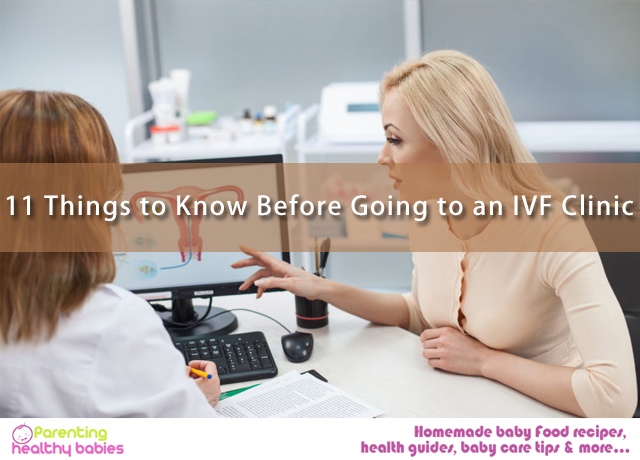In Vitro Fertilization is an assisted reproductive technology (ART) commonly referred to as IVF. IVF is the process of fertilization by extracting eggs, retrieving a sperm sample, and then manually combining an egg and sperm in a laboratory dish. The embryo(s) is then transferred to the uterus.IVF can be used to treat infertility in the following patients:
- Blocked or damaged fallopian tube
- Male factor infertility including decreased sperm count or sperm motility
- Women with ovulation disorders, premature ovarian failure, uterine fibroids
- Women who have had their fallopian tubes removed
- Individuals with a genetic disorder
- Unexplained infertility
The success rate of IVF clinics depends on a number of factors including reproductive history, maternal age, the cause of infertility, and lifestyle factors. It is also important to understand that pregnancy rates are not the same as live birth rates. Following points are to be considered before visiting an IVF clinic:
11 Things to Know Before Going to an IVF Clinic
-
IVF is the most effective way for infertile couples to get pregnant
Chances of success vary between patients, particularly according to the age of the woman, but on average about 28% of patients will have a baby after one attempt at standard IVF. Do not deny the fact that the chance rates can be misleading sometimes.
-
Picking a right doctor
Finding the right physician under any circumstances can be a daunting task. A patient who needs help with fertility may be faced with complicated medical decisions. Friends, family, and even the press and the Internet can provide contradictory information, making it extremely important that each patient find the most appropriate physician to advise her, support her and guide her through treatment.
Also a right choice of the doctor will improve the success rate of getting pregnant.
-
Time consuming procedure
A full course of IVF usually takes between four weeks and two months, depending on how quickly your body responds to the various medications. And in that time, there’s a lot you have to do.
It’s important to note that on top of the medications and various procedures, you will need to be constantly monitored, with doctor’s appointments, blood tests, and ultrasounds, throughout the whole process.
-
Do not ignore the numbers
Financial costs vary a lot, but each cycle of IVF may cost several thousand dollars. You can get a rebate on some IVF items, while a private health fund may pay for other aspects of treatment. There are also the costs of medicines, tests and day surgery.
If you are considering IVF, it is important to talk to your doctor, the IVF clinic and your health fund (if you have one) to understand what you will be charged for and what you will be covered for.
You need to think about whether it is affordable for you and right for you.
-
It typically takes more than one cycle of IVF to become pregnant:
Some women do get pregnant with just one IVF cycle, but according to the National Infertility Association, most women need to undergo multiple rounds before they are successful. Based on statistics, the association recommends sticking it out for three cycles of treatment.
-
You are more likely to have a multiple pregnancy with IVF
The chance of a multiples pregnancy is increased with the use of fertility treatment. There are additional risks and concerns related to multiples during pregnancy including the increased risk of premature delivery and low birth weight.
-
You can choose your baby’s gender with an extra screening process
Once embryos are created in vitro, they are sometimes screened in order to choose the healthiest ones to implant into the mother’s womb. Called Pre-implantation Genetic Diagnosis (PGD), it’s a complete chromosomal analysis of each embryo. It is at this step that you can select the gender of the baby.
-
Consider genetic diagnosis (PGS testing)
PGS is a genetic study of the embryo produced during IVF treatment and can help you have a healthy baby. The PGS test Is performed on the embryo before it is transferred.
-
Get guidance on how to best administer your meds
While preparing your body for baby, your physician may also recommend a progesterone regimen. A fast fact, the body normally produces progesterone after ovulation. Since ART manipulates the normal cycle, most doctors put a patient on progesterone to help prepare the uterus for implantation.
Progesterone can be either vaginal or intramuscular. The vaginal preparations may be a tablet or gel. The injections are terrible at first! An intramuscular injection uses an inch-long needle directly into your upper buttocks. Doctors will tell you there may be soreness at the injection site in addition to bruising and localized swelling. Icing prior to administering the injection helped ease the pain. Once you get past the first week, it becomes more manageable.
-
Change your diet to counteract some medication side effects:
Constipation is a common complaint since “progesterone is a smooth muscle relaxant.” Though you can take remedies like milk of magnesia to ease your discomfort, they will often leave you feeling more nauseated than before. Comfort can be achieved by taking a nutritional diet.
Choosing a high-fiber diet, filled with fruits, vegetables, whole grains, plant-based proteins and plenty of water will help to ease your constipation. Plus, focusing on anti-inflammatory foods, like berries, dark leafy greens, and omega-3 boosting salmon, will help to decrease the inflammation you’re experiencing while also enhancing your fertility.
Eating a nutritious diet, sleeping at least seven to eight hours nightly, and avoiding alcohol and other toxins and chemicals will improve your outcome.
-
Don’t lose hope
Experience tells us that women under 35 have the highest success rates for conceiving through both natural and assisted reproductive technologies. Beyond that age, the chances for success begin to decline significantly. Stay positive and confident on your respective IVF journeys, but also be mindful that factors such as age, weight, lifestyle habits and general health will determine your likelihood of success.













